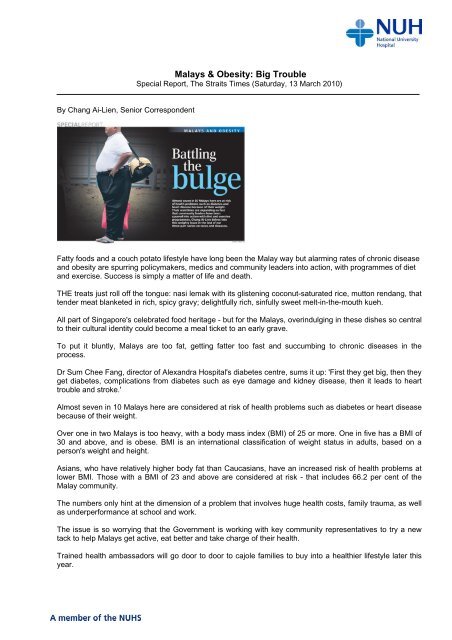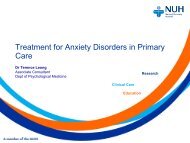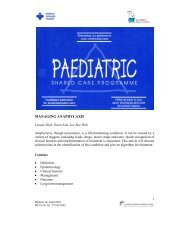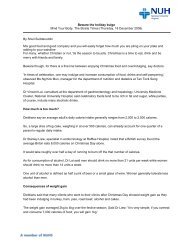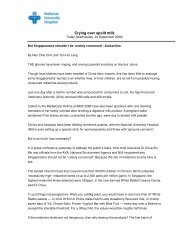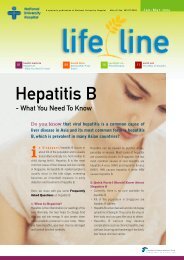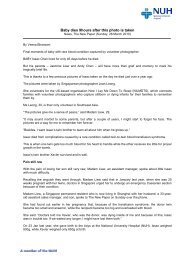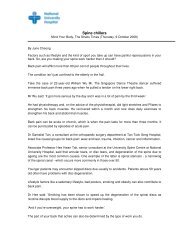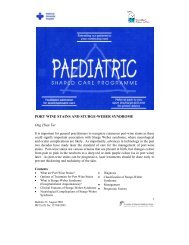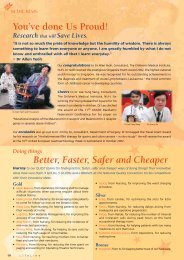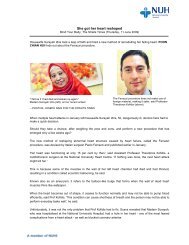Malays & Obesity: Big Trouble - NUH
Malays & Obesity: Big Trouble - NUH
Malays & Obesity: Big Trouble - NUH
Create successful ePaper yourself
Turn your PDF publications into a flip-book with our unique Google optimized e-Paper software.
By Chang Ai-Lien, Senior Correspondent<br />
<strong>Malays</strong> & <strong>Obesity</strong>: <strong>Big</strong> <strong>Trouble</strong><br />
Special Report, The Straits Times (Saturday, 13 March 2010)<br />
Fatty foods and a couch potato lifestyle have long been the Malay way but alarming rates of chronic disease<br />
and obesity are spurring policymakers, medics and community leaders into action, with programmes of diet<br />
and exercise. Success is simply a matter of life and death.<br />
THE treats just roll off the tongue: nasi lemak with its glistening coconut-saturated rice, mutton rendang, that<br />
tender meat blanketed in rich, spicy gravy; delightfully rich, sinfully sweet melt-in-the-mouth kueh.<br />
All part of Singapore's celebrated food heritage - but for the <strong>Malays</strong>, overindulging in these dishes so central<br />
to their cultural identity could become a meal ticket to an early grave.<br />
To put it bluntly, <strong>Malays</strong> are too fat, getting fatter too fast and succumbing to chronic diseases in the<br />
process.<br />
Dr Sum Chee Fang, director of Alexandra Hospital's diabetes centre, sums it up: 'First they get big, then they<br />
get diabetes, complications from diabetes such as eye damage and kidney disease, then it leads to heart<br />
trouble and stroke.'<br />
Almost seven in 10 <strong>Malays</strong> here are considered at risk of health problems such as diabetes or heart disease<br />
because of their weight.<br />
Over one in two <strong>Malays</strong> is too heavy, with a body mass index (BMI) of 25 or more. One in five has a BMI of<br />
30 and above, and is obese. BMI is an international classification of weight status in adults, based on a<br />
person's weight and height.<br />
Asians, who have relatively higher body fat than Caucasians, have an increased risk of health problems at<br />
lower BMI. Those with a BMI of 23 and above are considered at risk - that includes 66.2 per cent of the<br />
Malay community.<br />
The numbers only hint at the dimension of a problem that involves huge health costs, family trauma, as well<br />
as underperformance at school and work.<br />
The issue is so worrying that the Government is working with key community representatives to try a new<br />
tack to help <strong>Malays</strong> get active, eat better and take charge of their health.<br />
Trained health ambassadors will go door to door to cajole families to buy into a healthier lifestyle later this<br />
year.
Several mosques are also leading the charge with exercise regimes, health checks and cooking sessions in<br />
a pilot project that will eventually be rolled out to every mosque.<br />
The obesity issue has Minister-in-charge of Muslim Affairs Yaacob Ibrahim concerned.<br />
'Making inroads into exercise and diet is a challenge,' he tells The Straits Times. 'In particular, the message<br />
to eat healthily has to seep in. It's an input, output thing; we have to start cutting back to what we actually<br />
need.'<br />
Doctors and community leaders are equally concerned.<br />
Madam Halimah Yacob, deputy secretary-general of the National Trades Union Congress (NTUC) and<br />
former chairman of the Government Parliamentary Committee for Health, is very worried because obesity is<br />
associated with diseases such as diabetes and high blood pressure, which could lead to heart attack and<br />
kidney failure.<br />
'I think we should continue to engage the Malay-Muslim organisations and the mosques as these are<br />
effective vehicles to reach out to the community,' says Madam Halimah, who rides a stationary bicycle or<br />
does brisk-walking for 45 minutes several times a week to keep fit.<br />
'In addition, we should focus a lot more on the women as they are the ones that plan and cook for the<br />
family.'<br />
The incidence of chronic illnesses like kidney failure is already much higher among <strong>Malays</strong>, and, notes<br />
cardiologist Mak Koon Hou, they are more likely than other races to die from a heart attack. 'With increasing<br />
prevalence of diabetes and obesity, the occurrence of these chronic diseases will likely increase further.<br />
Health programmes targeted at <strong>Malays</strong> are needed to improve their outcomes,' he says.<br />
FAT-SATURATED DIET<br />
DOCTORS can point to the main culprits: a fat-saturated diet consisting of rich gravies, sweet dessert and<br />
fast food, on top of a sedentary lifestyle.<br />
Endocrinologist Lee Chung Horn says: 'Most of us believe <strong>Malays</strong> are the heaviest ethnic group because of<br />
their diet which often includes high-calorie food like fried noodles, lontong lemak, nasi lemak, sayur lodeh,<br />
curry lemak, mutton rendang, beef rendang and Malay kueh.'<br />
According to the 2004 National Nutrition Survey, one in two <strong>Malays</strong> has deep-fried food more than twice a<br />
week. One in five has at least seven sweetened drinks weekly.<br />
<strong>Malays</strong> have also overtaken Indians when it comes to the amount of fat in their diet. They consumed 85.7g<br />
of fat each day, the survey found, up from 68.9g in 1998. In comparison, Indians had 83.3g, while the figure<br />
for Chinese was 77g.<br />
What does not help is that social functions centre on eating. '<strong>Malays</strong> are also very gregarious people, and<br />
arguably the most family-oriented of our country's major races,' says Dr Lee, who is president of the<br />
Singapore Association for the Study of <strong>Obesity</strong>, which comes under the International <strong>Obesity</strong> Task Force, a<br />
body that works with the World Health Organisation and other stakeholders to fight obesity.<br />
'Traditional Malay culture is characterised by social assemblies, and at these assemblies - weddings,<br />
birthdays, parties - extended families and friends come together to meet and eat.'<br />
Researchers have uncovered variants of genes that seem to be associated with obesity, but there is no<br />
evidence yet that ethnic differences in obesity have a genetic basis, says clinician-scientist Tai E Shyong, a<br />
consultant at the National University Hospital's (<strong>NUH</strong>) endocrinology department.<br />
'What has been found so far is that these genetic variants explain only a small proportion of the risk of<br />
obesity,' he says.
But while genetic factors may predispose some people to being fat, the main causes are clearly a highcalorie<br />
diet combined with a sedentary lifestyle, notes Professor Chia Kee Seng, head of the epidemiology<br />
and public health department at the National University of Singapore's Yong Loo Lin School of Medicine.<br />
'We should also look at the other end of the spectrum and study behaviour modification, and what is needed<br />
to encourage people to lose weight.<br />
'Physical activity in Singapore is promoted as a leisure activity. We could look at what structural changes are<br />
needed for people to make it part and parcel of life, to get them to walk from point A to B rather than drive.'<br />
Dr Yaacob notes that most <strong>Malays</strong> eat out, eat late and indulge frequently in rich foods such as nasi beriani,<br />
which in the past were a rare treat.<br />
He laments that the expanding halal food industry has also embraced unhealthy options such as fast food.<br />
And he urges <strong>Malays</strong> just to change one thing, for starters: 'We should have dinner earlier, so as not to<br />
sleep on a full stomach.'<br />
EVERY LITTLE BIT COUNTS<br />
DOCTORS say the benefits of losing weight - no matter how little - are tremendous.<br />
Dropping as little as 2 per cent of one's weight can improve diabetes control and often results in a reduction<br />
in medications, says Dr Tham Kwang Wei, director of the obesity and metabolic unit at the Singapore<br />
General Hospital Life (Lifestyle Improvement and Fitness Enhancement) Centre.<br />
'The more weight one loses, the greater benefit one will see,' she adds, pointing to a recent study conducted<br />
by the United States National Institutes of Health, which showed that participants who lost 8.6 per cent of<br />
their weight over a year through diet and exercise improved their diabetes condition.<br />
They reduced not only their diabetes medications, but those for blood pressure and cholesterol as well.<br />
While Dr Yaacob is heartened to see more women taking to regular exercise, he notes men do not seem to<br />
be doing their bit. 'I see them jogging in their tudung and brisk-walking. For their husbands to join them,<br />
that's a lifestyle change I'd like to see.'<br />
The percentage of obese Malay women dipped slightly from a high of 23.7 per cent in 1998 to 21.4 per cent<br />
in the 2004 National Health Survey, but the figure for Malay men almost doubled to 16.9 per cent from 8.8<br />
per cent over the same period.<br />
Doctors want to see the results of this year's National Health Survey before judging if the weighty issue of<br />
Malay women is indeed on a downward trend. But anecdotally, this group - traditionally the most sedentary -<br />
seems to be exercising more.<br />
One customised programme that has taken off among women is 'kebayarobics' - an amalgam of aerobics<br />
with traditional Malay joget dance movements introduced by the Health Promotion Board (HPB). About 100<br />
groups now do it regularly in places like mosques and community clubs since it started catching on here in<br />
2004.<br />
The need to get men on an exercise regime has prompted the board to set up a pilot programme with three<br />
mosques and the Football Association of Singapore to hold weekly soccer sessions. It has 80 sign-ups so<br />
far.<br />
Over the next few months, the HPB will work with Malay caterers to customise healthier menu options, such<br />
as curries made with low-fat milk and vegetable dishes.<br />
Nurses have also been selected to conduct workshops at community clubs and mosques for people who are<br />
overweight and at risk of developing chronic conditions, while mosque staff and cooks are being trained to<br />
whip up healthier food.
Dr Annie Ling, director of HPB's Adult Health Division, says the board was looking at customising<br />
programmes for other races, or specific groups such as women, but decided to start with <strong>Malays</strong> because<br />
'this is where the need is greatest'.<br />
The Committee for Community Health, set up in 2008 to work with the HPB on tailoring programmes for<br />
<strong>Malays</strong>, believes <strong>Malays</strong> will take to exercise if the initiative starts from the ground up and is rolled out with 'a<br />
human touch'.<br />
'We are bringing the mountain to Muhammad,' says its chairman, cardiologist Abdul Razakjr Omar.<br />
Dr Abdul, who is a consultant at the National University Heart Centre's cardiac department, adds that the<br />
problem among <strong>Malays</strong> - the race with the lowest median income here - is also a social issue.<br />
Studies in developed countries such as the US have shown that obesity is more prevalent among the poorer<br />
and less educated. 'I believe that the more educated in our community should come forward to help,' he<br />
says.<br />
His committee now comprises 10 Malay/Muslim representatives including doctors, grassroots mosque and<br />
media representatives. It means business, he says, adding that 'this is not just going to be a public relations<br />
exercise'.<br />
One initiative is Sihat 360�, or Health 360�, a pilot programme involving four mosques in the southwest:<br />
Darussalam, Ar-Raudhah, Hasanah and Al-Khair.<br />
A full-time Malay health promotion coordinator stationed at one of the mosques organises health screenings,<br />
exercise sessions, healthy cooking classes, weight and disease management workshops and so on.<br />
Dr Abdul devised the idea after noting how the <strong>NUH</strong> heart failure programme had achieved sterling results<br />
by employing a Malay case manager to ensure Malay patients were taking their medication, eating properly<br />
and getting exercise. 'A lot of the time, people need motivation, someone to befriend them and to win their<br />
trust when they visit their homes, or at mosques where many <strong>Malays</strong> congregate,' he explains. 'It helps to<br />
have someone to call if you have a problem.'<br />
If Sihat 360� takes off, similar projects will be rolled out in the 69 mosques islandwide, he adds.<br />
In another initiative, 15 Malay grassroots leaders at Jurong Green are being trained by medics on chronic<br />
disease management and monitoring blood pressure and glucose levels, and even negotiation skills, says<br />
committee vice-chairman Zuraimi Mohamed Dahlan, a general practitioner who is volunteering time to<br />
conduct the weekly training.<br />
They will visit people in their homes to check for obesity, high blood pressure, diabetes and high cholesterol,<br />
and encourage them to adopt a healthy lifestyle.<br />
As well, 80 grassroots volunteers from Sembawang and Nee Soon East and Central constituencies are<br />
being trained as 'health champions' to work with residents under a similar scheme.<br />
REACHING OUT<br />
ALEXANDRA Hospital staff have come up with a similar concept.<br />
Dr Michael Wong, head of the family and community medicine department and director of the Health for Life<br />
Centre, says it is planning to work with six mosques in the north, to hold health talks for worshippers.<br />
Doctors, nurses, physiotherapists, dietitians and psychologists will hold sessions at the mosques, when staff<br />
move to the new Khoo Teck Puat Hospital in Yishun this year.<br />
Darul Makmur Mosque manager Suzana Bakar says that such talks had been done on an ad hoc basis<br />
before, and that a more structured programme would hopefully yield better attendance and results. She<br />
adds that physical and spiritual food do go together.
'There is a commandment for Muslims to ensure that the food we eat is permissible in source and<br />
substance, and also good and nutritious for the body,' she says. 'It's our responsibility to not only make sure<br />
our food is halal, but to also look out for healthy ingredients.'<br />
Driver Mohammed Yussof, 45, for one, says he would be keen to attend such sessions. 'I don't have much<br />
free time, so if I can get some tips when I go for prayers, it will be very useful.'


